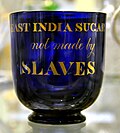Free-produce movement
Free-produce movement
The Free-produce movement was an economic boycott and social activism strategy employed by abolitionists in the United States and United Kingdom during the 19th century, aimed at undermining the slave economy. The movement encouraged individuals and businesses to only purchase and sell goods that were certified as being produced without the labor of enslaved people. This was part of a broader effort to end slavery by attacking its economic underpinnings.
Origins[edit]
The Free-produce movement originated in the late 18th century but gained significant momentum in the 1820s and 1830s. It was inspired by the Quakers, who were among the first to promote the idea that consumers had a moral responsibility to avoid complicity in slavery through their purchasing decisions. The movement sought to create a market for goods produced by free labor and thereby reduce the demand for slave-made products.
Principles[edit]
The core principle of the Free-produce movement was the ethical consumption of goods. Supporters believed that by refusing to buy products made by enslaved individuals, they could decrease the profitability of slavery. This was seen as a peaceful method of undermining slavery, in contrast to more direct forms of abolitionist action such as the Underground Railroad or armed insurrection.
Impact[edit]
Despite its noble intentions, the Free-produce movement struggled to have a significant impact on the economy of slavery. One of the main challenges was the difficulty in verifying that goods were indeed produced by free labor. Additionally, free-produce goods were often more expensive and less readily available than their slave-produced counterparts, limiting their appeal to consumers. Nevertheless, the movement played a crucial role in raising awareness about the connections between consumer choices and slavery.
Legacy[edit]
While the Free-produce movement did not directly lead to the end of slavery, it laid important groundwork for later social justice and ethical consumption movements. It highlighted the power of collective consumer action to effect social change and inspired future generations of activists to use economic boycotts as a tool for advocacy.
This article is a social-movement-related stub. You can help WikiMD by expanding it!
-
East India Sugar not made by Slaves Glass sugar bowl
-
Anti-Saccharrites colored etching by James Gillray
-
Mrs. F. E. W. Harper, Author and Lecturer, Philadelphia, Pa
-
Henry Highland Garnet by James U. Stead
Ad. Transform your life with W8MD's Budget GLP-1 injections from $75


W8MD offers a medical weight loss program to lose weight in Philadelphia. Our physician-supervised medical weight loss provides:
- Weight loss injections in NYC (generic and brand names):
- Zepbound / Mounjaro, Wegovy / Ozempic, Saxenda
- Most insurances accepted or discounted self-pay rates. We will obtain insurance prior authorizations if needed.
- Generic GLP1 weight loss injections from $75 for the starting dose.
- Also offer prescription weight loss medications including Phentermine, Qsymia, Diethylpropion, Contrave etc.
NYC weight loss doctor appointmentsNYC weight loss doctor appointments
Start your NYC weight loss journey today at our NYC medical weight loss and Philadelphia medical weight loss clinics.
- Call 718-946-5500 to lose weight in NYC or for medical weight loss in Philadelphia 215-676-2334.
- Tags:NYC medical weight loss, Philadelphia lose weight Zepbound NYC, Budget GLP1 weight loss injections, Wegovy Philadelphia, Wegovy NYC, Philadelphia medical weight loss, Brookly weight loss and Wegovy NYC
|
WikiMD's Wellness Encyclopedia |
| Let Food Be Thy Medicine Medicine Thy Food - Hippocrates |
Medical Disclaimer: WikiMD is not a substitute for professional medical advice. The information on WikiMD is provided as an information resource only, may be incorrect, outdated or misleading, and is not to be used or relied on for any diagnostic or treatment purposes. Please consult your health care provider before making any healthcare decisions or for guidance about a specific medical condition. WikiMD expressly disclaims responsibility, and shall have no liability, for any damages, loss, injury, or liability whatsoever suffered as a result of your reliance on the information contained in this site. By visiting this site you agree to the foregoing terms and conditions, which may from time to time be changed or supplemented by WikiMD. If you do not agree to the foregoing terms and conditions, you should not enter or use this site. See full disclaimer.
Credits:Most images are courtesy of Wikimedia commons, and templates, categories Wikipedia, licensed under CC BY SA or similar.
Translate this page: - East Asian
中文,
日本,
한국어,
South Asian
हिन्दी,
தமிழ்,
తెలుగు,
Urdu,
ಕನ್ನಡ,
Southeast Asian
Indonesian,
Vietnamese,
Thai,
မြန်မာဘာသာ,
বাংলা
European
español,
Deutsch,
français,
Greek,
português do Brasil,
polski,
română,
русский,
Nederlands,
norsk,
svenska,
suomi,
Italian
Middle Eastern & African
عربى,
Turkish,
Persian,
Hebrew,
Afrikaans,
isiZulu,
Kiswahili,
Other
Bulgarian,
Hungarian,
Czech,
Swedish,
മലയാളം,
मराठी,
ਪੰਜਾਬੀ,
ગુજરાતી,
Portuguese,
Ukrainian



